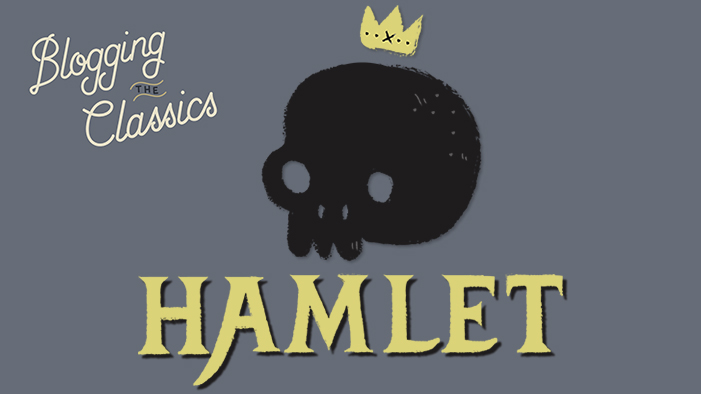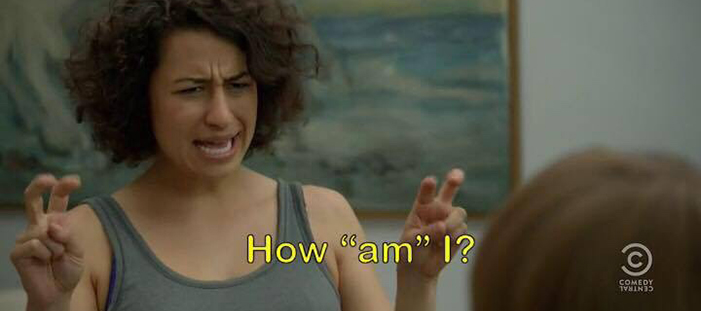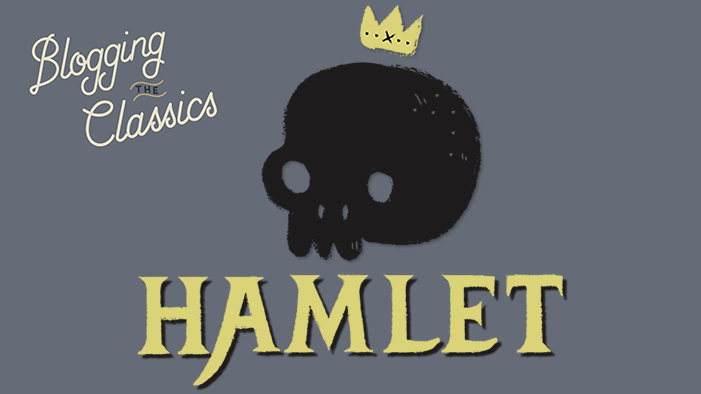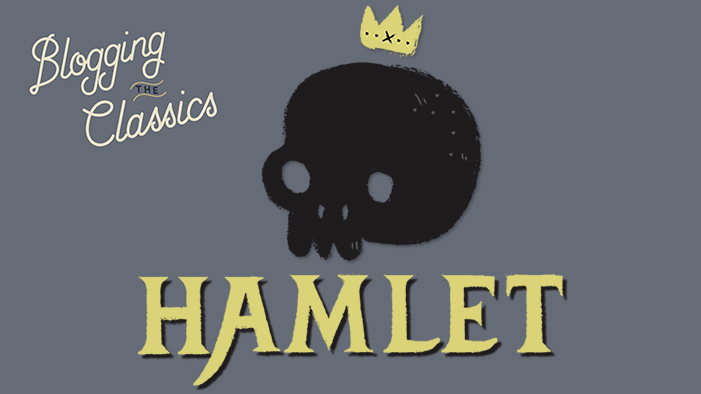Blogging Hamlet: Part 1

As someone who spends a lot of time perusing the various revenge plots and sex jokes of Shakespeare, I’ve come to believe that the Bard of Avon really only wrote three kinds of plays:
- Someone’s in love, and this is terrible.
- There’s been a misunderstanding, and this is hilarious.
- *EXISTENTIAL ANXIETY ABOUT PASSING THE BATON OF DIVINE RULE FROM ONE MONARCH TO THE NEXT*
Hamlet somehow manages to be all three, which is why it’s one of Shakespeare’s most complex tragedies. The plot is not simply a straight shot between Point A (everything’s fine) to Point B (everyone’s dead); we have to make a few pit stops along the way at “contemplating mortality” and “someone got stabbed by accident.”
So I bet your default setting, insofar as Hamlet is concerned, is “confused.” That’s because, well, Hamlet can be confusing. I’m here to make it less confusing, or at least sort of funny. I’ve done this kind of thing a time or two before. In the past, I’ve made quips about The Great Gatsby, Lord of the Flies, and The Odyssey, and I’m prepared to make more quips if the situation calls for it. Let’s go!
Hamlet begins, as all good stories do, with a little midnight jaunt, a possible ghost, and some shoehorned exposition about the history of Denmark for the benefit of the audience.
In Act 1, Scene 1, two watchmen are standing guard outside the castle. One of them goes to bed, which resonates with me; I, too, find myself constantly leaving right before something cool is about to happen. The other, Barnardo, is soon joined by two men called Marcellus and Horatio. Barnardo and Marcellus have been telling Horatio that there’s a ghost lurking about doing the kinds of things that ghosts do, like spooking the horses and moving people’s keys. Horatio, a sensible and college-educated man, doesn’t believe them.
They decide to hang around and see if the ghost shows up. In high school, my friends and I used to do something similar—we would head on over to this defunct asylum and wait for something spooky to happen. Instead of giving up after ten minutes and going to Taco Bell, however, Horatio and the boys do indeed see what looks like the ghost of their king who recently died. Intrigue!
Marcellus tells Horatio to talk to the ghost because he’s the only one who’s been to college, where presumably he majored in ghost talking. Horatio makes an attempt to do so but the ghost leaves, unimpressed.
Horatio, who’s uneasy, notes that all of Denmark is on edge. Their much-adored King Hamlet just died (leaving behind a son, also named Hamlet), but before he did so, he defeated their greatest enemy, Norway, in battle. He then killed their king, the hilariously named Fortinbras. Rumor has it that Fortinbras’s son, whose name is also Fortinbras, is now rallying the rebel troops to take back his land and possibly launch an attack. I guess no one in this play has ever heard of a baby book, or regular names like Josh or Stan. /exposition
Suddenly, the ghost reappears! Horatio and Marcellus have the following (actual) conversation:
HORATIO: The ghost is back! Do something, Marcellus!
MARCELLUS: Should I hit it with my spear?
HORATIO: Probably.
Predictably, this “bludgeoning the likeness of your dearly departed king” approach doesn’t pan out favorably, and the ghost leaves for good. Horatio suggests they go tell Prince Hamlet.
Now, there isn’t a TON of literature available on the proper way to marry a man’s wife immediately after his death, but in Act 1, Scene 2, I think we can all agree that Claudius, the successor to King Hamlet, is doing it badly. Claudius was the king’s brother. When King Hamlet died, Claudius swooped in and married the queen—or at least, that’s how it looks to Hamlet the Younger, who’s sulky about this whole thing to say the least. He feels that his father probably would NOT have wanted his brother to marry his wife, but, well, I guess the man should’ve thought about that before he died.
King Claudius gives this rousing speech about how Hamlet Prime is dead, and that’s sad, but they all need to move the hell on. He says that marrying the queen, Gertrude, and assuming the kingship of Denmark was necessary, and that everyone was basically begging him to do it. I bet Hamlet the Younger is rolling his eyes right now. I bet this went down at the wedding:
HAMLET: Hey Uncle Claudius, when I give the best man speech, should I say “conniving opportunist” or “shameless cuckold”?
CLAUDIUS: Just say “hero.”
His energy is all wrong. You’ve got Prince Hamlet, who’s grieving appropriately, and then you’ve got Claudius, who’s cheerful and practically bursting into every room like the Kool-Aid Man. He probably hired a clown for the funeral and a bounce house to boot. His dialogue is full of contradictory emotions as he juxtaposes the sorrow of losing his brother with the joy of having married his “sister, now wife.”
That established, Claudius decides to get down to some kingly business, namely:
- Sending two of his courtiers to open up a dialogue with Norway
- Allowing Laertes, the son of his advisor, Polonius, to return to France
- Dealing with Hamlet
Let’s talk about Hamlet. I love this little lunatic. He and I are, for all intents and purposes, the same person. We are unable to make decisions, we’re constantly dressed in all black, and we’re both obsessed with the crushing weight of death. Claudius chastises his nephew (now stepson) for continuing to don his funeral garb. Gertrude agrees and tells Hamlet to “cast thy nighted color off.” Everyone dies, she says, so why does his father’s death seem so particular to him?
The fresh prince of Denmark responds with “Excuse me, ‘seems’? It doesn’t ‘SEEM,’ Mother, it just IS,” and he goes off on this whole tangent about how his black clothes can only hint at the eternal melancholy hidden deep within his soul. Translation:
GERTRUDE: Hamlet, how are you?
HAMLET:
 Comedy Central
Comedy Central
Hamlet is probably suffering from depression. In the sixteenth century, this was poorly understood. They called it “melancholia,” and everyone just assumed you had black bile in your spleen. True to form, Claudius says that this grief is “unmanly,” and urges him to get over it. He tells Hamlet he won’t be allowed to return to university at Wittenburg; instead, he’ll be staying right here in Denmark.
Everyone leaves, and Hamlet soliloquizes. He says, among other things, that:
- He wishes suicide wasn’t a sin, because death is the only thing that’ll sweeten this crap biscuit
- His mother relenting and marrying his uncle shows weakness on her part, and all women are the same (apparently women are like the Borg)
- His mother’s marriage to Claudius is basically incest
- Claudius isn’t half the man his father was
- This family sucks
Just then, Horatio shows up. Hamlet and Horatio know each other from school. In the span of one conversation, Hamlet goes from “hey Horatio, what’s up” to “HORATIO, YOU’RE A PERFECT SPECIMEN OF A MAN,” which is probably why he doesn’t doubt it for even a second when Horatio says he saw the ghost of Hamlet’s father.
Hamlet asks a lot of bizarro and increasingly specific questions about this ghost (“Was he wearing armor? How long did he stick around? What color was his beard?”) before concluding that the ghost’s presence must be a portent of doom. Clearly, something’s wrong in Denmark. He decides to stand guard with them tonight—with any luck, he’ll be able to chat with his dead father.
QUOTE OF THE WEEK
CLAUDIUS: But now, my cousin Hamlet, and my son—
HAMLET: (muttering darkly) A little more than kin and less than kind.
Basically:
CLAUDIUS: Hey there, nephew who is also my son now.
HAMLET: I hate this family.
THOUGHTS
- For historical context, marrying your brother’s wife wasn’t all that acceptable, even in Shakespeare’s time. Henry VIII did it with Catherine of Aragon, and where did that get him? Dead with six wives and no living male heir to show for it is where.
- The entire atmosphere of the palace (also known as Elsinore) is kind of “Gothic before Gothic was cool.” Claudius is trying to act like everything’s normal by being extra chipper. Stop trying to make normal happen, Claudius.
Looking for more Blogging the Classics? Click here!















